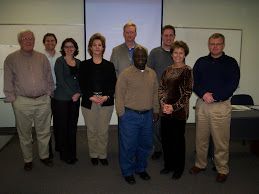John, the problem with traditional approaches to learning organizations is the assumption of tenure of employment.
In the "old days" workers would be around long enough to provide ROI, return on investment, in upgrading their skills, knowledge.
It may be that the "learning organization" ought to focus more on Knowledge Management, the capture of "lessons learned" from implementing processes and project than on the traditional Training and Development model of skilling.
Let the contract workers invest in their own skills.
Then, capture the learning synergy they provide on the job as they interact with others.
This kind of Knowledge Management shifts the cost of training to the "free agent" worker, away from the employer, but at the same time, Knowledge Management captures the results of the interaction of this knowledge with the organization, project, process, etc.
In other words, the employers will "steal" knowledge from their hires.
This is how the enterprise will learn, but it will not be a two-way street in which the employer provides investment in the skills, knowledge base of the contract hires.
On the other hand, free agents can also "turn the tables" and work long enough for employers to "steal" their knowledge!
The breakdown of the traditional "social contract" of loyalty in the workplace is going to rewrite the rules of organizational development away from Training and Development toward Knowledge Management.
Dr. Rux









No comments:
Post a Comment